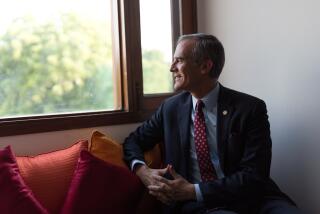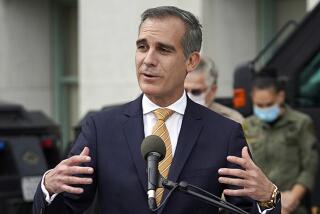U.S. Envoy Close to Zia at Crucial Times in Pakistani Leader’s Career
- Share via
ISLAMABAD, Pakistan — At a number of critical moments during the long political career of Pakistani President Zia ul-Haq, U.S. Ambassador Arnold L. Raphel was not far away.
On July 4, 1977, as a young political officer at the U.S. Embassy here, Raphel walked Zia to his car after the traditional American Independence Day celebration. The two men talked intimately as they walked. They smiled, shook hands and said goodby.
A few hours later, Gen. Zia, the Pakistani army’s chief of staff, came to power after staging a lightning military coup that overthrew Prime Minister Zulfikar Ali Bhutto.
Government Dismissed
And 11 years later, Raphel, as ambassador to Pakistan, met with Zia in May before the president made the boldest move of his presidential career, unilaterally dismissing his country’s entire elected government.
And so it was late Wednesday afternoon that the two men again were together--this time in death.
It was not unusual that Raphel, 45, rode along with the president and his most senior generals Tuesday as they traveled to Bahawalpur to test new U.S. military equipment that Pakistan is considering buying.
And if the two countries were close, the two men were even closer.
Spoke Fluent Urdu
A career Foreign Service officer, Raphel spoke fluent Urdu, one of the official Pakistani languages, and immersed himself in every aspect of Pakistani life in an effort to better understand a nation that was his home three times during his career.
Raphel knew that to understand Pakistan, it was necessary to understand Zia, , the man who ruled it with an iron hand for more than a decade and was considered responsible for Bhutto’s hanging in April, 1979.
During private conversations, Raphel spoke of Zia in a tone that was at once critical yet admiring. He was impatient for Zia to return his nation of more than 100 million to democracy, and he was harsh in his assessment of the military’s powerful hold on Pakistan.
Often, Raphel referred to what he called “the chilling effect” of Bhutto’s hanging and of Zia’s dismissal of the National Assembly earlier this year.
Shrewd Politician
But at the same time, Raphel marveled at Zia’s abilities as a shrewd and charming political manipulator. The ambassador often confided that Zia’s deft handling of Pakistan’s divided political opposition, coupled with his strong hold on the country’s powerful military, was a feat unmatched by most modern rulers in Asia.
And, as an analyst of Pakistan’s internal affairs, Raphel often was nothing short of prescient.
Two months before Zia announced that national elections would be held Nov. 16, at a time when most analysts were expressing doubt that a vote would be held at all, Raphel accurately predicted the month Zia would set for it and even correctly anticipated the controversial election rules.
Raphel was one of the main architects of U.S. policy toward Afghanistan. He was a forceful advocate of limiting Washington’s objectives to the withdrawal of Soviet forces, and he argued that the United States should not become involved in Afghan politics after the Soviet pullout. He also said his government should maintain an arm’s-length relationship with the moujahedeen, the U.S.-supported Muslim rebels who have been fighting the Soviet-backed Afghan government for nearly nine years.
Debate in Congress
The ambassador was not without his critics, however. Just two months ago, Raphel was the focus of a heated debate in the U.S. Congress. Several lawmakers complained that, with Afghanistan and Pakistan such key nations, Raphel was spread too thin and needed another ambassador-level officer in his embassy to handle the Afghan issue.
During his Senate confirmation hearings in April, 1987, conservatives led by Sens. Gordon J. Humphrey (R-N.H.) and Jesse Helms (R-N.C.) attacked Raphel for being “too soft” on the Soviet presence in Afghanistan. The senators already had delayed Raphel’s appointment by more than six months.
Eventually, Sen. Claiborne Pell (D-R.I.) came to Raphel’s rescue, praising him for having spent 20 years of his life deeply involved in Pakistani affairs. The Senate ultimately confirmed Raphel’s appointment by a vote of 76 to 19.
Again last month, after strong support from top State Department officials, Raphel survived another battle when the Senate agreed to add a diplomat in Islamabad to look after Afghanistan--although one with a lesser rank than Raphel’s.
But throughout his tenure as ambassador here, it was Raphel’s relationship with Zia that attracted the attention of most Pakistani analysts and politicians.
When word surfaced a few days after Zia dismissed the government that the two men had met just a few hours before the action, newspapers and opposition politicians suggested that Zia’s “constitutional coup” had somehow been engineered by the United States--or perhaps by Raphel himself.
The ambassador sidestepped the issue by insisting that Zia never mentioned his plans during the meeting, just as Raphel had insisted that Zia never divulged to him the plans for his coup during their walk to the car in 1977.
In the wake of the criticism, Raphel was careful not to show any bias in internal Pakistani political affairs. Within days of Zia’s dismissal of the government, Raphel spent two hours over lunch with Benazir Bhutto, Pakistan’s main opposition leader, who has been Zia’s principal foe.
Despite his widely regarded insight into the country and its political leaders, Raphel always managed to maintain a droll humility.
During one of his last background briefings with foreign journalists here, Raphel smiled at one point while discussing this country’s political future.
“Whatever I’ve predicted about Pakistan and President Zia,” Raphel said, only half-jokingly, “he’s always done something else, and something else has always happened.”
Assigned to Iran
Raphel was involved in southwest Asian diplomacy for more than 20 years, beginning with his assignment to Esfahan, Iran, as a 24-year-old State Department recruit in 1967.
During the Iran hostage crisis of 1979-81, Raphel was deeply involved in efforts to secure the captives’ release, working as a special assistant to then-Secretary of State Cyrus R. Vance and Vance’s successor, Edmund S. Muskie.
Raphel was born March 16, 1943, in Troy, N.Y., and was graduated from Hamilton College, Clinton, N.Y., in 1964. Before joining the Foreign Service, he earned a master’s degree from Syracuse University.
Raphel was recently married to Nancy Ely, a State Department assistant legal adviser for African affairs. He had a daughter by a previous marriage.
Vance said in a statement issued from his office in New York that he was heartsick over Raphel’s death.
“He was a superb Foreign Service officer and a wonderful friend,” Vance said. “Our country and all of us who were privileged to know him have suffered a great loss.”
More to Read
Sign up for Essential California
The most important California stories and recommendations in your inbox every morning.
You may occasionally receive promotional content from the Los Angeles Times.













